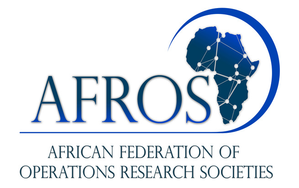- Mission of the AWG
AWG mission is here stated as “to undertake action research, apply and develop Operations Research (OR) methodologies and tools with which to solve social-economic problems and alleviate poverty; and advise on relevant policies and strategies by promoting OR education and practice in Africa, exchanging experiences, organizing meetings and conferences and publishing proceedings, research results and innovation outcomes”.
- Rationale
The need for re-orientation of Operations Research education, research and practice to address specific and pertinent problems of developing countries was realised a long time ago; see for instance (Sagasti 1976, Rosenhead and Tripathy 1996, Fourie 1999, Stewart 2006, Fourie 2007). The situation persists today. There are only a few established OR Societies in Africa which are functioning, serious and well organised; and can foster OR development in this direction like ORSSA of South Africa.
The main argument is that, while generally OR mitigates problems related to efficiency, effectiveness and efficacy, the focus for Africa should go further to address issues of livelihood, quality of life (and of working life), community empowerment, sustainability and indeed, poverty eradication. This is in line with almost all the Sustainable Development Goals (SDG) because OR is cross-cutting. There are cases where some scientists have applied Multi-Criteria Decision Analysis, just to mention one tool out of many, to support decision making on relevant matters: local government development programmes (Scott 2005, Scott 2005 b); forestry use planning (Nordstrom, Eriksson et al. 2010); allocation of fishing rights (Stewart, Joubort et al. 2010); participatory decision making in rural areas (Kakeneno 2013, Kakeneno and Brugha 2016) and many others.
The proposed Working Group shall be part of the AFROS research and innovation forum to add to what others have done and, indeed promote the vision of enhancing the contribution of OR to sustainable development, quality of life and poverty eradication in Africa.
There is a dire need for Africa to develop and implement analytical methodologies and tools with which to analyse productivity and sustainable (human) development trends and relationships, and impacts on the status of livelihood and poverty; advice on allocation, and optimisation of resources; and process mapping and re-engineering (in the context of productivity enhancement); and to inform strategy and policy formulation on social-economic development; and poverty alleviation. It is intended that our Working Group shall make good application of available Operations Research (OR) methodologies and tools to solve problems and support decision-making processes in this area. The group shall, further, undertake to review and develop methodologies and tools that could seem to be appropriate for the environments of Africa.
Our group is inter-disciplinary in which knowledge and accumulated experiences from various specialities such as Combinatorial Optimisation, Meta-heuristics, Problem Structuring, Multi-Criteria Decision Analysis, Multi-Objective Programming, Game Theory and others shall make a big difference. Besides, the area allows for the application of any or a combination of those provided that the issue at hand is addressed. Traditional OR, for instance, focuses on resource allocation and utilisation; and also the management of products and services there out. While it has advanced technically, it does not seem to address correctly contextual and situational aspects of Africa particularly sustainable development and Poverty analysis. Our other strategy is to address also production and service delivery processes. Indeed this will make another difference. Our approach shall be action-based, participatory and inclusive. In this regard, thorough stakeholder analysis will be conducted so that relevant people are involved and are ready to own the outcomes of the decision process. Further, we have arranged that the programmes and projects will involve both academia and industry to contribute and benefit together from research and innovation geared toward sustainable development and poverty eradication. It could also seem desirable for our group to extend coverage to governance that generally mitigates all the pillars of development planning and management.
- Activities
The following shall be the activities of our group as will be updated from time to time depending on circumstances:
- Promotional activities for awareness of OR especially for Sustainable Development and Poverty Analysis in the academia (Education, Training and Research), industry (Innovation) and governments ( Policies and Strategies) across Africa;
- Maintenance of a database of OR men and women in Africa who are interested in the subject area;
- Coordinate OR related research, advisory and innovation activities that are geared toward sustainable development and poverty analysis in Africa;
- Undertaking all activities related to establishing research agenda, call for abstracts and papers, evaluation of the same and arrangements for delivery;
- Undertaking activities related to meetings and conferences on OR topics that are relevant to the mission of the group, AFROS and IFORS; and compilation and publishing of proceedings.
Any other activity that could seem relevant to the mission and the subject area.
- Organization and Members
- Prof. Allen Rangia Mushi, Department of Mathematics, University of Dar es Salaam, Tanzania; mushi.allen@udsm.ac.tz
- Dr Joseph Rwegalura Kakeneno, Chief Executive Officer; Decision Analytics and Management Services Ltd; Tanzania, joekakeneno@yahoo.co.uk
- Dr Egbert Mujuni, Senior Lecturer, Department of Mathematics, University of Dar es Salaam, Tanzania, egbertmujuni2016@gmail.com
- Prof. Fredrick Mtenzi, Associate Professor, Institute for Educational Development, The Agakhan University, Dar es Salaam, Tanzania; fredrick.mtenzi@aku.edu
- Dr Mashaka Mkandawile, Lecturer, Department of Mathematics, University of Dar es Salaam, Tanzania; mkandawilemj@gmail.com
- Dr Said Sima, Lecturer, Department of Mathematics, University of Dar es Salaam, Tanzania, said.sima@gmail.com
- Dr Sumaya Kagoya, Lecturer, Makerere Business School, Makerere University, Uganda; skagoya@mubs.ac.ug
To join this AWG, please email to Joseph Rwegalura Kakeneno at joekakeneno@yahoo.co.uk
